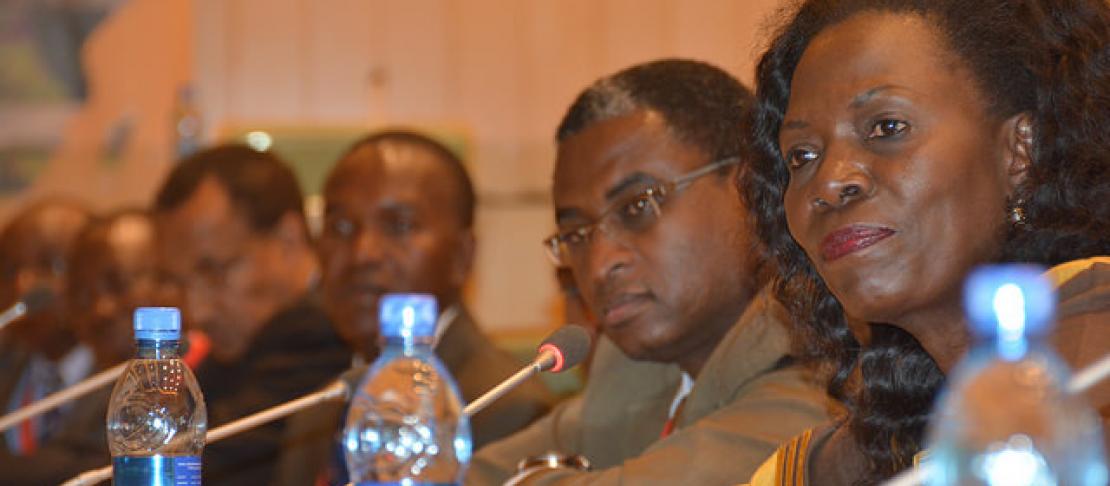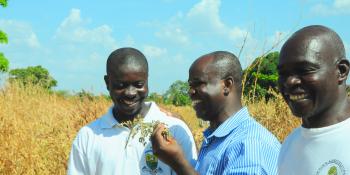Researchers and Tanzanian policy makers to discuss climate change and gender policy

An upcoming meeting between researchers from international research centers and Tanzanian policy makers aims to support gender responsive policy making and climate adaptation.
On September 14, researchers from the International Institute of Tropical Agriculture (IITA), International Centre for Tropical Agriculture (CIAT), and the CGIAR Research Program on Climate Change, Agriculture and Food Security (CCAFS) will share their findings on gender and climate change policy with the Tanzanian Parliament. In collaboration with the Tanzanian Civil Society Forum on Climate Change (Forum CC) and the Ministry of Agriculture, Livestock and Fisheries (MALF), the event encourages policy strategies and actions that will ensure gender responsive policy making and climate adaptation.
Like much of Sub-Saharan Africa, Tanzania’s population is dependent on agriculture for food security and livelihoods – an estimated 70 percent of Tanzanian women and 65 percent of Tanzanian men are employed by the agriculture sector according to the World Bank. Climate change will impact agriculture production as weather patterns become more unpredictable and extreme. Adaptation strategies can help smallholder farmers cope with these conditions. However, because gender is such an important contributor to differences in resource access, decision-making, and division of labor, researchers have long noted that for policy to be effective, gender issues must be considered.
In the past, Tanzanian policy makers have taken active steps to create gender-equitable policies. The Women and Gender Development Policy (2000) underscored the prominent role of women in development and, in 2005, the country even amended its constitution to increase the level of women’s participation in government. Still, as of 2013, Tanzania ranked 123 out of 149 on the Gender Inequality Index. This, along with research findings, indicates that more change is needed. These research findings, like those from a recent policy and budget review, help to illustrate the extent to which policy and budgets consider gender issues, a key component of effect policy and policy implementation.
The upcoming “gender in policy evidence” meeting in Tanzania will be similar to the 2016 High Level Gender, Climate Change and Food Security event held in Uganda. There, the Ugandan Parliament received information on key gender and climate change research findings. Additionally, policy recommendations were crafted to encourage gender considerations in future decision-making and methods for gauging accountability were developed. In a follow-up meeting, members of the parliamentary forum on climate change and Uganda Women’s Parliamentary association identified strategies that they can employ to ensure policies, implementation strategies and gender responsive budgets. Policy makers in Uganda reported a greater understanding of the relationship between climate change, gender, and food security. Based on the results, members of parliament demanded a hastened formulation of the National Climate Change Bill. By August 2017, the bill had made its way through the national consultation process.
In Tanzania, combatting gender inequities could take the form of goals, implementation strategies, and budgeting that consider gender and are coordinated between national and local policies. Organizers of the upcoming event hope to make the links between gender and climate change even more apparent and to encourage policy makers to include gender issues in future adaptation plans and policies. They also plan to make the proceedings of the event widely available to encourage continued conversation.
Read more:
- Study reveals the gender gap in Tanzania, Uganda climate policies
- Climate Change Adaptation in Agriculture and Natural Resource Management in Tanzania: A Gender Policy Review
- Gender responsive policy formulation and budgeting in Tanzania: do plans and budgets match?·
Kathlee Freeman is a communications consultant with CCAFS.



